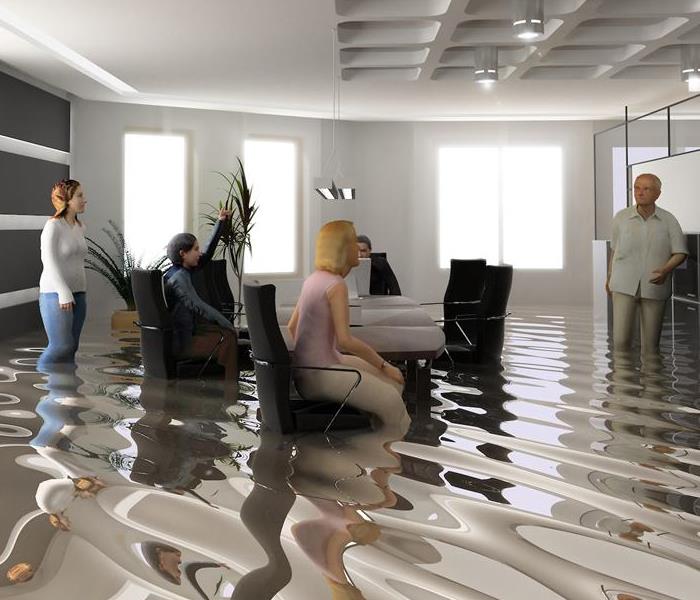Is It Clean, Gray or Black Water? Get In the Know On H2O
5/18/2021 (Permalink)
A faulty grease trap backs up the sewer of a seafood restaurant. A heavy storm floods a creek that seeps into an adjacent apartment complex. Roots from a 100-year-old cedar tree penetrate a sewer line outside a beauty salon. A cracked toilet tank leaks overnight throughout the administration offices of an industrial plant.
In each of these commercial cleanup emergencies, business owners and property managers must deal with contaminated water that can quickly turn into a critical situation if not handled properly.
When it comes to cleanup and disinfection of commercial spaces, it’s best to call certified water damage restoration experts. The SERVPRO of NW Charlotte, Lincoln County, Southern and NE Gaston County team is trained to handle contaminated water emergencies properly and works 24/7/365 to help our customers get their property back to business.
While we work to provide relief against water damage, it’s essential for business owners and property managers to know the different types of contaminated water. You can easily see or smell contaminates in some cases, but water can look and smell perfectly fine and still be harmful.
Clean, gray and black water: What’s the difference?
Water damage can be classified by three types of contaminated water: clean, gray and black.
Clean water is free from bacterias and viruses and comes from a source like a broken water supply line or leaking faucet. If not treated quickly, clean water can turn into gray or black water, depending on the length of time, temperature and contact with surrounding contaminants.
Gray water, or wastewater, hasn’t come into contact with solid human waste but is still considered contaminated. It also may contain bacteria and viruses that cause discomfort or illness. Gray water drains and flows from places such as showers, sinks and baths. It also comes from overflowing washing machines, dishwashers and toilets with urine but no feces.
If done correctly, gray water can be filtered and reused for lawns and gardens; however, it also can quickly degrade if left untreated.
Black water is highly contaminated and contains harsh chemicals and human waste filled with harmful bacteria and disease-causing pathogens. You should avoid contact with black water as it can cause severe illness or death if ingested. Water is considered black when it comes from a toilet bowl with feces or sewer back-up. It’s also generated from overflowing streams or rivers mixed with sewer water and standing water with microbial growth.
Sewage cleanup and commercial water restoration
Any water contaminated with sewage backup should be considered an emergency and addressed as quickly as possible. The water may contain viruses, bacteria and other microbes that cause serious illnesses. And if black water isn’t removed promptly, it can rot, dry out and lead to airborne contamination.
SERVPRO professionals are specially trained and have the equipment and protective gear to safely restore your business. Our water damage restoration specialists will inspect your business to determine the appropriate plan of action for the type of water encountered.
We’re locally owned and operated and part of the Mecklenburg, Lincoln and Gaston communities. Our fire damage restoration technicians are employees, not contractors. They can respond to sewage cleanup and water damage emergencies with the most advanced cleaning equipment, products and technology to get you back to business. To learn more, call us anytime at (704) 393-7890 or request help online.





 24/7 Emergency Service
24/7 Emergency Service
